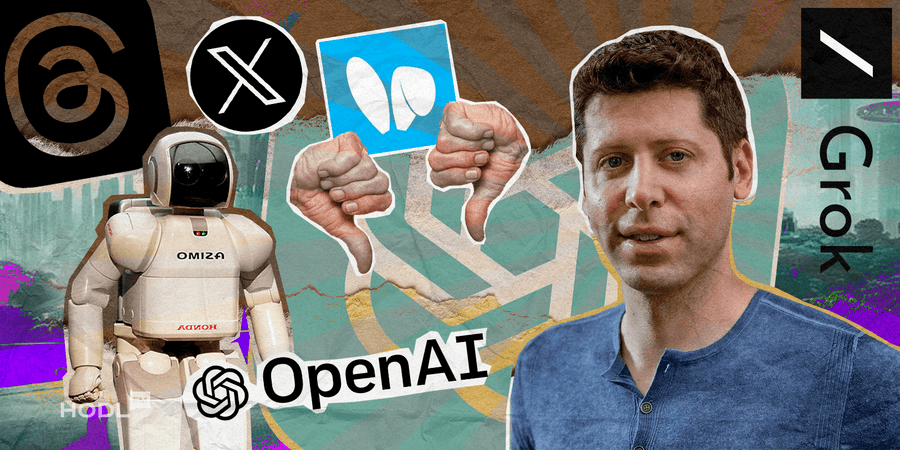Not long ago, our minds were captivated by and in awe of achievements like the Internet of Things (IoT), 5G Networks, Smart Home Technology, and other fancy tech things. Now this technology will not surprise anyone and it has become commonplace. Enter the new star of this year’s tech show – artificial intelligence (AI)!
The AI and tech landscape of 2023 highlights the saga starring Sam Altman from OpenAI, while revolutionary AI models like ChatGPT, Grok, and Gemini took center stage, each bringing their unique flair to the field. And let’s not forget the new social networks, old rebranding shuffles, and a few epic fails that caught our eye. We’ve rounded up all the most thrilling tech events for you. Sit back and let’s plunge into this progressive world together.
AI and Tech Biggest News 2023
Are you ready for the drama, the breakthroughs, and the humor that has defined the AI narrative this year?
Sam Altman Saga
In November 2023, OpenAI saw quite the leadership rollercoaster with the departure of CEO Sam Altman, causing a stir in the artificial intelligence community. Initially, OpenAI announced Altman’s departure from both CEO and the board itself, appointing Mira Murati, the company’s tech director, as the interim CEO. This unexpected shake-up sent shockwaves through the industry.
However, in a plot twist worthy of a blockbuster, Sam Altman made a lightning-fast comeback, reclaiming the CEO throne at OpenAI in less than five days after his initial departure.
ChatGPT, Grok and Gemini
ChatGPT, Grok, and Gemini: the trio that rocked the scene in the past year!
- Let’s start with ChatGPT: this pre-trained generative transformer model from OpenAI burst onto the scene in late 2022, quickly gaining fame for its ability to hold engaging conversations on a wide range of topics. ChatGPT’s impressive language skills and accessibility via API made it a top choice for developers and researchers, leading to its integration into various chatbots, creative writing tools, and even educational platforms.
Since launching ChatGPT in November 2022, by January 2023, the active user count skyrocketed to 100 million, making it the fastest-growing app in history.
Related: ChatGPT’s Mastery, Windows AI Hype, Crypto Chaos, and KYC Marvel
- Grok, inspired by the bizarre creature from “The Hitchhiker’s Guide to the Galaxy” and programmed to tackle almost any question with a dash of humor, is truly a fascinating concept.
From what the intel suggests, Grok stands as a cutting-edge AI designed by xAI, leveraging the X platform to gather real-time knowledge about the world. It’s geared to tackle a wide spectrum of questions, even the spiciest ones that might make other AI systems shy away.
Grok’s still in prototype mode, playing hard to get with the public. xAI’s taking the tease approach, offering a sneak peek to a select few users in the US.
Related: Welcome Grok: Elon Musk’s AI Chatbot
- Gemini is a language model from Google AI. It specializes in dishing out informative, all-encompassing answers to the burning questions. Trained on a colossal stash of text and code data, it navigates complex topics, translates languages, crafts diverse creative text formats, and even tackles those open-ended or brain-bending requests.
In the coming months, this AI hotshot will strut its stuff in other company products and services like Google Search, Ads, Chrome, and Duet AI. Gemini is Google’s shot at crafting an all-in-one AI powerhouse, aiming to lock horns with OpenAI’s GPT-4. Let the battle of the AI titans commence!
Related: Google’s Gemini: The GPT-4 Challenger Aimed at Dominating AI
OpenAI
Amidst the whirlwind of AI achievements in 2023, OpenAI stands tall as a powerhouse, consistently pushing the boundaries in artificial intelligence research and development. This nonprofit research company boasts a board with big shots like Elon Musk and Sam Altman.
OpenAI keeps rolling out innovations in the realm of language models, expanding the horizons of natural language processing with projects like Jurassic-1 Jumbo and the much-anticipated GPT-4.
Related on ChatGPT:
- OpenAI’s $51 Million Gamble on Brain-Inspired Chips: A Well-Prepared Move or CEO’s Personal Interest?
- OpenAI Faces Internal Turmoil: Over 500 Workers Protest, Eyeing Microsoft
AI Policy and Regulation
This year, everyone from the US Senate to the “Big Seven” due to responsible AI adoption has been discussing policies and regulations. Early December saw European lawmakers wrapping up a tension-packed political year by giving a nod to the AI Act, setting down mandatory rules and standards on how to craft the riskiest AI types more responsibly. Plus, it’s waving the finger at some “unacceptable” AI gigs, like the cops using facial recognition in public spots.
Meanwhile, over at the White House, they unveiled the artificial intelligence executive order and got the bigwig AI governance companies to sign up for some voluntary commitments. Its efforts aimed to improve AI transparency and standards, while giving agencies greater freedom to tailor AI rules to their own sectors.
AI Memes
Time to take a breather from the serious stuff and peek into the comedic world of AI!
The colossal AI tech race is in full swing:
It’s a meme that folks laugh at but might leave developers straight-faced:
It’s probably best not to go mushroom hunting relying solely on artificial intelligence:
And, of course, we couldn’t skip over the AI-generated memes themselves, like bees hosting a conference:

And there’s a Spider-Man in Ancient Rome.
Copyright in the Age of AI
As robots unleash their artistic prowess, writing poems, sketching portraits, and composing symphonies, a wave of legal and ethical AI questions crashes in ‘Who owns the rights to these creations?’ Traditional copyright protects works born from human creativity, leaving a puzzler for AI-generated pieces:
Is AI “human” enough to be a creator?
Do the rights fall to the human programmer?
Who claims the masterpiece that snagged the prize: AI, its coder, or the contest host?
Tech giants and artists are diving into innovative solutions like joint ownership models or AI-focused licensing systems. The US Copyright Office has taken the initiative to study this issue by hosting public hearings and gathering opinions on this head-scratcher.
While laws are still in the oven, there’s been some courtroom drama. A federal judge ruled that artworks crafted by AI aren’t eligible for copyright protection.
Friend.tech Boom and Failure
Friend.Tech, a decentralized social media integrated with X. The platform came up with a quirky market for investing in individuals – content creators and celebs alike. Yep, you can buy or sell these so-called “shares.” Buyers get a ticket to the group chat. There, shareholders can slide into the DMs of the person they’ve invested in, while the profile owner responds to everyone in the main channel. It’s like buying a backstage pass to someone’s digital life.
This social-media-plus-earning platform isn’t all sunshine and rainbows. Firstly, it doesn’t play nice with the App Store rules, probably because of its “stock” trading feature. Then there’s the mystery of where user data is stored, wallet keys, and all. Friend.Tech had a data leak of over 100,000 X users, and the experts blame it on some weak API game.
“Shares” on the platform are extremely volatile, and their price depends on the creator’s actions. If the user abandons the app, the token prices will plummet. Additionally, the functionality of the project opens up many opportunities for scammers. Pump&Dump schemes and fake celebrity accounts – it’s a fraudster’s playground.
Even the crypto squad isn’t clinking glasses to Friend.Tech. A user named Yazan spilled the tea, saying the app’s got a lifespan of about six to eight weeks before share prices and activity take a nosedive.
X Rebranding
In July 2023, Twitter, as we knew it, went through a dramatic makeover, swapping the familiar blue bird for the elegant letter “X” and starting a whole new chapter under the simple title “X.” This unexpected rebranding sent shockwaves through social media, sparking heated debates and leaving users scratching their heads.

The motives behind this dramatic change:
Being the new Twitter overlord, Elon Musk, known for his love affair with the letter “X” and his desire to turn the platform into an all-encompassing “super-app,” felt that the name “Twitter” no longer matched the grandiose future he envisioned for the company.
The new name aimed to signal a departure from the platform’s traditional roots as a microblogging site, embracing broader functionalities like payments, e-commerce, and even streaming video.
Threads
In the loud world of social media, where photos often steal the spotlight, Instagram’s Threads, launched in July 2023, is spinning a different tale. This text-centric app, unlike its flashy parent platform, has carved its own niche, offering a space for intimate and fleeting conversations.
Threads satisfy our desire for direct, unfiltered communication. What sets it apart?
- Photos and videos become secondary players, serving as the backdrop to text updates and fleeting moments shared with close friends.
- Posts vanish within 24 hours, creating a sense of urgency and fostering real-time engagement.
- The app thrives on carefully curated lists of close friends, promoting deeper connections and a more targeted community.
- Threads prioritizes simplicity and accessibility, sporting a clean layout and user-friendly features.
It caused a stir at launch, roping in 1 million users in just an hour and hitting 100 million users within five days. Even though Threads has dipped by 79% from its peak usage, it’s still got 10.3 million active daily users.
AstraZeneca’s Step Towards Conquering Cancer
The Anglo-Swedish pharmaceutical maestro, AstraZeneca, inked a deal worth $247 million with Absci, US artificial intelligence biologics firm, to cook up some antibody magic against cancer.
AstraZeneca team with Absc aims to craft an AI-generated model that shoots for the stars without firing a single shot – a blueprint for whipping up fancy new therapies based on antibodies. However, they’ve been tight-lipped about which flavor of cancer they’re aiming to target.
Related: The Strenght of AI: AstraZeneca’s Step Towards Conquering Cancer
Absci’s wielding generative AI to concoct top-tier drug candidates, focusing on snazzy qualities like target affinity, safety, tech-savviness, and a bunch of other cool factors.
Humanoid Agents
Imagine a robot not just looking like a huan but also busting human-like moves, showcasing smarts, and even throwing in some emotions. That’s the humanoid agent for you! These intricate contraptions usually blend complex mechanical structures to strut around on two legs, handle stuff, and dish out expressive gestures.
Algorithms and machine learning fuel decision-making, perception, computer vision, and the ability to navigate the world. Natural language processing and sensory tech give ’em the gift of gab and decoding human signals.
Related: The Rise of Humanoid Agents: Elevating AI Simulations to Unprecedented Realism
The uses for these humanoid agents are far and wide:
- Healthcare Robotics. From aiding therapy to hand-holding patients and even pulling off delicate surgeries.
- Education. Making reinforcement learning fun, roping in students with interactive lessons, tailored teaching, and real-life simulations.
- Customer Service. Serving up info, solving queries, and dishing out personalized recommendations.
- Entertainment. Strutting their stuff on shows, diving into games, and engaging audiences for a jaw-dropping experience.
In the past year, we’ve been witnesses to thrilling discoveries and developments in the realm of artificial intelligence and technology. From industrial automation to cancer cures, AI, with all its mind-blowing capabilities, is sure to keep surprising us in the years to come. As we eagerly await innovations, one thing remains certain: the captivating world of artificial intelligence is never short of surprises!
FAQ
What were the brightest and the darkest moments for AI and tech this year?
Google’s AI initiative to tackle climate change and AstraZeneca’s teaming up with Absci in the fight against cancer stand out as shining examples of using AI to better lives and protect the planet.
But if we’re talking about the most pressing issue in AI and Tech of this year, let’s spotlight the AI Weaponizations. The potential use of AI in autonomous drones weaponry and cybersecurity warfare poses a serious threat. International collaboration and ethical boundaries are urgently needed to prevent an AI arms race.
Who were the villains and heroes of the year in AI and tech?
The hero of the year undoubtedly goes to Demis Hassabis of DeepMind. His team’s breakthrough in protein folding using AI could revolutionize drug discovery and healthcare.
As for the villains of the year, companies like Clearview AI take the spotlight. Their controversial mass surveillance practices raise serious concerns about privacy enhancing technologies violations and the improper use of AI-powered security.
Loudest and biggest Gossip of the year?
The conspiracy theory trophy goes to GPT-4. Rumors are swirling about the secretive development of the next version of OpenAI’s powerful language model. Speculations range from its capabilities surpassing human intelligence to its potential dark side and nefarious use.
Disclaimer: All materials on this site are for informational purposes only. None of the material should be interpreted as investment advice. Please note that despite the nature of much of the material created and hosted on this website, HODL FM is not a financial reference resource and the opinions of authors and other contributors are their own and should not be taken as financial advice. If you require advice of this sort, HODL FM strongly recommends contacting a qualified industry professional.











